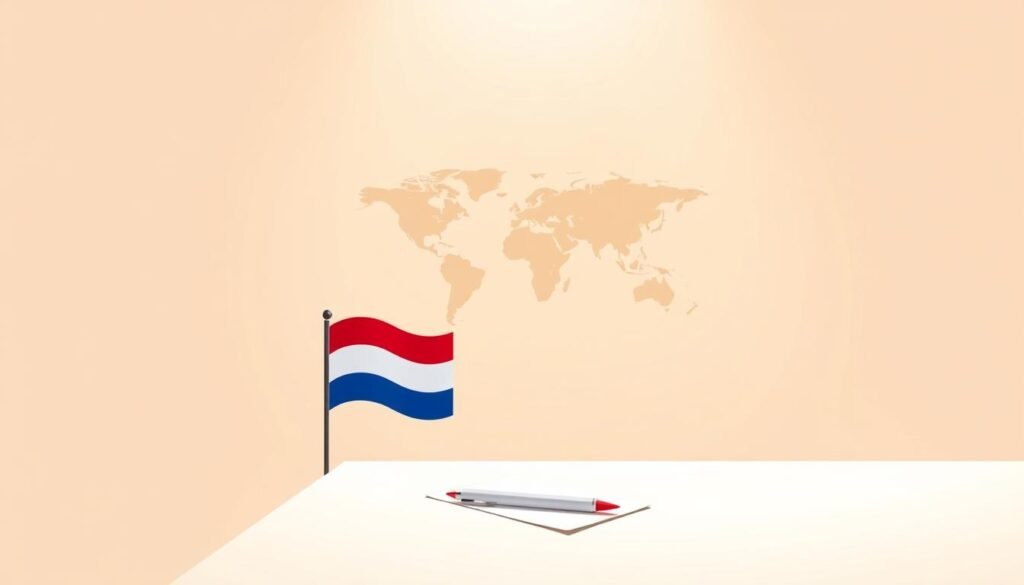Are you dreaming of studying in Europe but unsure how to fund your education? The Netherlands offers a unique opportunity for international students to pursue their academic goals without financial stress. With over 2,000 English-taught programs, this European destination is a hub for quality education and cultural diversity.
Financial support is a key factor for many students. Scholarships here range from €5,000 to €12,500, covering tuition fees and living expenses. Funding bodies like the Dutch Ministry of Education, Nuffic, and top universities provide these opportunities. Every year, more than 15,000 international students benefit from these programs.
Prestigious institutions such as Delft University of Technology and Utrecht University are part of this initiative. The 2025-2026 academic year brings updated opportunities, making it the perfect time to plan your future. Combining tuition support with living cost assistance, these scholarships make studying abroad more accessible than ever.
Key Takeaways
- Over 2,000 English-taught programs available.
- Scholarships range from €5,000 to €12,500.
- Funding provided by Dutch Ministry of Education, Nuffic, and universities.
- More than 15,000 international students benefit annually.
- Updated opportunities for the 2025-2026 academic year.
- Combination of tuition and living cost support.
- Prestigious institutions like Delft and Utrecht University participate.
Introduction to Netherlands Scholarships
Studying in a new country often comes with financial hurdles, but support is available. The NL Scholarship is a prime example, offering partial tuition assistance to eligible students. This program is jointly funded by the Dutch Ministry of Education and participating universities, ensuring a robust support system.
The NL Scholarship provides €5,000 for the first year of study. It’s designed for bachelor’s and master’s students from non-EEA countries. This financial aid helps cover tuition costs, making education more accessible.
Over 55 institutions participate in this initiative, including research universities and applied sciences schools. However, it’s important to note that this scholarship is a supplement, not a full replacement for personal funding. Students must still plan for additional expenses.
Integrity is a key requirement. Applicants must adhere to Nuffic’s Code of Conduct, which promotes ethical behavior. Activities like financial misconduct or links to terrorism can disqualify candidates. This ensures the program supports deserving individuals.
For students seeking financial aid, the NL Scholarship offers a valuable opportunity. It combines government and institutional support, making it a reliable option for those pursuing higher education in a new country.
Types of Netherlands Scholarships
Funding your education abroad can be easier than you think with the right opportunities. There are two main categories of financial aid: government-funded programs and university-specific awards. Both offer unique benefits tailored to students’ needs.
Government-Funded Scholarships
The Orange Knowledge Programme is a standout option. It focuses on areas like food security, water management, and SRHR. Over 38 institutions and 400 courses are part of this initiative, benefiting more than 10,000 recipients.
Another popular choice is the NL Scholarship. It provides €5,000 for the first year of study across 21 research universities. This program aligns with Dutch international education policies, ensuring high standards.
University-Specific Scholarships
Many institutions offer their own financial aid. HAN University provides a tiered system, awarding €2,500 per semester up to €12,500 total. Students must meet academic performance requirements to qualify.
For STEM enthusiasts, TU Delft offers Excellence Scholarships. High achievers can also apply for Maastricht University’s High Potential Scholarships, which provide €7,500. Arts students aren’t left out, with specialized funding available at institutions like Amsterdam University of the Arts.
Most university awards have progressive payment structures. Students must earn at least 45 ECTS credits annually to maintain eligibility. This ensures academic progress while receiving financial support.
Eligibility Criteria for Netherlands Scholarships
Understanding the eligibility criteria is the first step toward securing financial aid for your studies. These conditions ensure that the right candidates receive support. They cover aspects like nationality, academic performance, and additional requirements.
Citizenship Rules
Most programs have a strict non-EEA nationality requirement. This means applicants must come from countries outside the European Economic Area. Dual nationality cases are considered based on primary citizenship.
Special provisions exist for Suriname nationals, making it easier for them to qualify. Always check the specific rules for your country before applying.
Academic Standards
Academic performance is a key factor. Minimum GPA equivalents vary by institution, so research your chosen program’s requirements. For example, HAN University requires an IELTS score of 6.5 or a TOEFL score of 90.
Some programs, like arts schools, may ask for a portfolio. Others require maintaining a certain number of credits annually to continue receiving funding.
Additional Conditions
Full-time enrollment is mandatory for most financial aid programs. Applicants must also be enrolling in Dutch higher education for the first time. Previous degrees from the country may disqualify you.
Compliance with the institution’s code of conduct is essential. This includes ethical behaviour and avoiding activities like financial misconduct. Setting up a local bank account is often required for disbursements.
How to Apply for Netherlands Scholarships
Securing financial aid for your studies abroad starts with a clear application process. Whether you’re applying to research universities or universities of applied sciences, understanding the steps is essential. Here’s a breakdown of what you need to know.
Application Process Overview
The first step is gaining admission to a participating institution. Once accepted, many programs automatically consider you for financial aid. Others require a separate application through the Nuffic portal. Post-acceptance, you may receive scholarship invitations directly from the institution.
Some programs, like those at HAN University, have specific deadlines—May 1 and October 19. Always check the website of your chosen institution for exact dates. Missing a deadline can disqualify you, so plan ahead.
Required Documents
Preparing the right documents is crucial. Most applications require certified academic transcripts and language proficiency certificates. A motivation letter and CV are also standard. For creative programs, you might need to submit a portfolio or a 3-minute video personal statement.
Ensure all documents are legalized if required. Some countries need a Nuffic certificate, so verify this early. Having everything ready will streamline your application.
Important Deadlines
Deadlines vary by institution. For example, Utrecht University and TU Eindhoven have different cutoffs. Some use rolling deadlines, while others have fixed dates. Payment cycles typically occur in November and April, so align your application accordingly.
Housing applications often tie into scholarship timelines. Apply early to secure both financial aid and accommodation. Staying organized is key to a successful application.
Participating Institutions
Choosing the right institution is a critical step in your academic journey. The Netherlands offers a diverse range of universities and vocational schools, each with unique strengths. Whether you’re drawn to research-focused programs or practical training, there’s an option tailored to your goals.
Research Universities
Research universities are ideal for students seeking in-depth academic exploration. These institutions focus on theoretical knowledge and cutting-edge research. Notable examples include Utrecht University, Groningen University, and Erasmus University Rotterdam.
With 14 research universities, including four technical schools, students have ample choices. Institutions like VU Amsterdam rank among the top 150 globally. Specialized schools, such as those in Apeldoorn and Kampen, offer theology programs for niche interests.
Universities of Applied Sciences
For those seeking hands-on learning, universities of applied sciences provide industry-focused programmes. These schools emphasize practical skills and real-world applications. Examples include Hotelschool The Hague, Zuyd University, and NHL Stenden.
With 22 vocational institutions, students can explore fields like media, games, and performing arts. Breda University is renowned for its creative programs, while Codarts Rotterdam excels in performing arts. These schools prepare graduates for immediate entry into their chosen industries.
Programmes at universities of applied sciences blend classroom learning with internships. This approach ensures students gain both knowledge and experience. Whether you’re pursuing a WO or HBO degree, these institutions offer pathways to success.
Conclusion
Pursuing your academic goals abroad is more achievable than ever with funding opportunities ranging from €5,000 to €12,500. These programs are highly competitive, so applying early is essential to secure your spot. The 2025-2026 academic year brings updates to participating institutions, making it a great time to start planning.
For detailed program specifics, contacting institutions directly is highly recommended. Many also offer post-scholarship work permits, providing valuable career opportunities after graduation. If additional funding is needed, exploring complementary sources can help cover any gaps.
For further information, Nuffic is a reliable resource to address your queries. Their team can guide you through the process, ensuring you have all the details to make informed decisions about your education.
FAQ
What types of scholarships are available for international students in the Netherlands?
There are two main types: government-funded scholarships and university-specific scholarships. Each has its own eligibility criteria and benefits.
What are the nationality requirements for these scholarships?
Most scholarships are open to non-EU/EEA students, but some may have specific nationality requirements. Always check the details on the official website.
What academic qualifications are needed to apply?
Applicants usually need a strong academic record. Specific requirements vary by scholarship and institution. Some may also require proof of language proficiency.
How do I apply for a scholarship in the Netherlands?
The process involves submitting an online application, required documents, and meeting deadlines. Each scholarship has its own application steps.
What documents are typically required for the application?
Common documents include academic transcripts, a motivation letter, a CV, and proof of language proficiency. Some may also require letters of recommendation.
Are there specific deadlines for applying?
Yes, deadlines vary by scholarship and institution. It’s crucial to check the specific dates on the official website to avoid missing out.
Which institutions participate in these scholarship programs?
Both research universities and universities of applied sciences offer scholarships. Each institution has its own set of programs and criteria.
Can I apply for multiple scholarships at once?
Yes, you can apply for multiple scholarships, but ensure you meet the eligibility criteria for each one. Keep track of deadlines and required documents.









